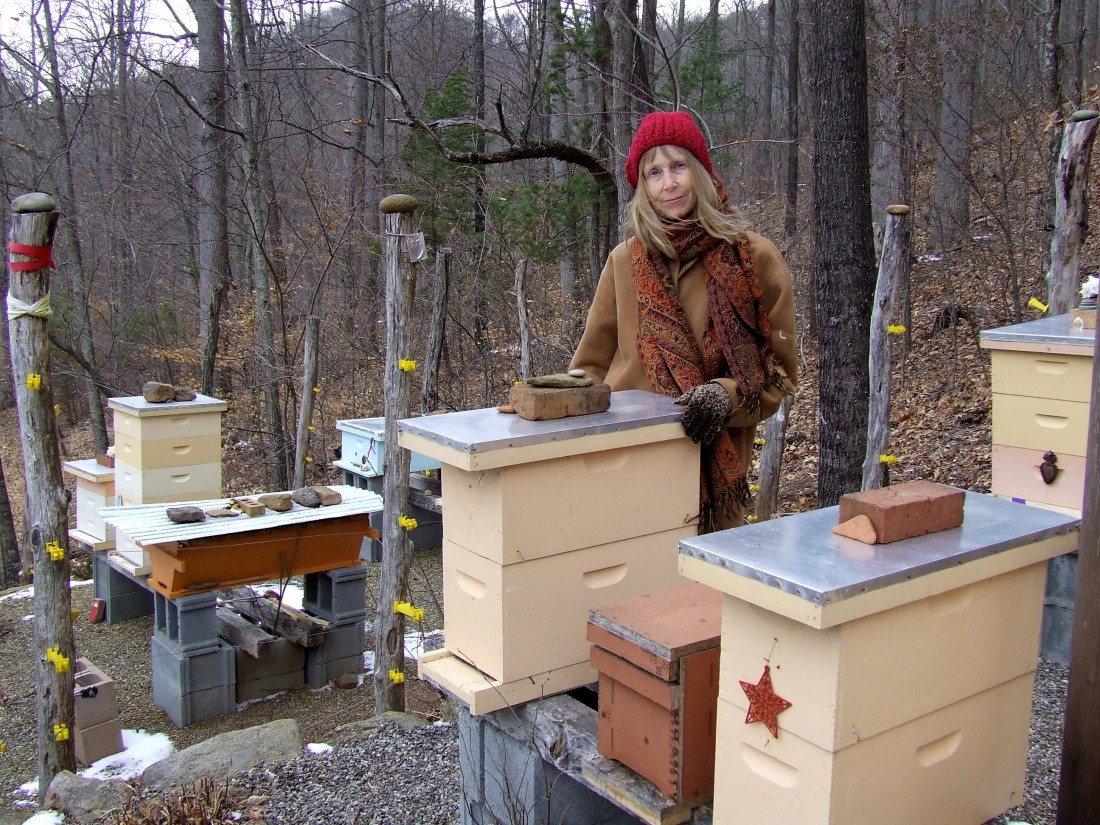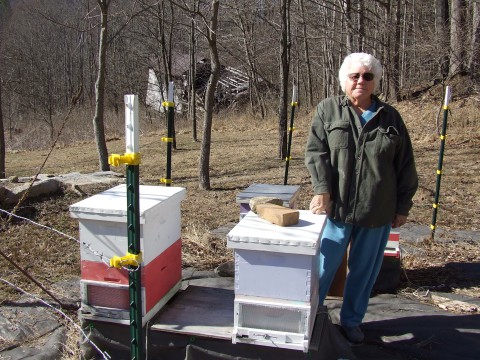In a bowl-shaped valley tucked away in Spring Creek near Hot Springs, Lady Spirit Moon Cerelli of BEe Healing Apiary tends to her hives. A renaissance woman in every regard, Cerelli is a military veteran, a fiber artist, a trained herbalist and a certified beekeeper, specializing in beekeeping free of pesticides, antibiotics or essential oils. She’s also an apitherapist.
Cerelli uses bee venom on non-allergic patients for the treatment of chronic health concerns including autoimmune deficiency, arthritis and muscular dystrophy. She places a bee on an acupuncture point of the body and WHAP! Once she strikes the bee, its stinger penetrates the skin and the venom sinks in. For gentler “micro doses,” Cerelli takes the stinger of a single bee and uses it to prick different points, mainly around the eyes and on some tiny scars, though she says all treatments are individualized.
Apitherapy, or “bee therapy,” is the medicinal use of bees and the products from their hives for health and wellness. Apitherapy utilizes everything from honey to pollen to venom to somatic experiencing, where body sensations are used to heal from trauma. Proponents of the practice claim bees and their products can address chronic pain, post-traumatic stress disorder and various diseases, including arthritis, multiple sclerosis, migraines and skin conditions such as eczema, psoriasis and herpes.
But apitherapy is considered more anecdotal than scientific by much of the medical community. Though researchers at Washington University have used synthetic melittin (an active compond in bee venom) to shrink or slow the growth of tumors in mice, the American Cancer Society reports that no clinical studies in humans show bee venom or other honeybee products are effective in preventing or treating cancer. Georgetown University Medical Center conducted a study on the beneficial effects of bee venom for treating multiple sclerosis, but found insufficient evidence to support the claim.
Dr. Ellison Smith and his colleagues at Asheville Arthritis and Osteopeorosis Center note that bee venom has been show to reduce inflammation and pain in experimental models, but few studies have been done to determine its effectivness on humans. “There are also reports of arthritis and autoimmune diseases being caused by bee strings and venom,” Smith adds.
But Jon Christie, the owner of Wild Mountain Bees, an apiary in Woodfin, notes that there is “a wealth of healing in the hive.”
“There are benefits from honey for wound healing,” Christie says. “The pollen profiles in the honey give you allergy benefits. Propolis can be tinctured and poulticed and has anti-cancer properties and powerful wound-healing properties. It’s really good as a selective natural antibiotic.”
Cerelli asserts that bee venom is also effective for managing severe spinal stenosis and arthritis — in fact, she uses the method on herself. “The bees keep me walking,” she says.
As an example, she offers a story: One day while working in her bee yard, she dropped a frame of bees and was stung 40 times all over her body. Two days later, she fell and broke two bones in her right leg. The two events were “synergistic,” she says. Eight weeks later, when looking at the X-rays of her recovering leg, Cerelli says her surgeon made a strange observation: Her chronic arthritis had been significantly reduced. “How can that be?” her surgeon asked, to which Cerelli replied: “Honey, that’s what you call bee venom.”
While some may question the effect of the venom, one thing is certain — when a honeybee’s barbed stinger is detached, as in the case of a sting, the bee dies. This is why, Cerelli says, the treatment is only meant for severe cases. After the procedure, Cerelli will honor the bees by placing their bodies in water and saying a blessing for their life and their sacrifice, before offering their bodies to the earth.
Is it justifiable to take a bee’s life to treat human pain, especially in the face of colony collapse disorder and dwindling honey bees? Christie notes, “You have to think of bees as a colony, as a super-organism, so [taking] a few bees out of that colony, I feel, is not detrimental to the health of the colony.”
Cerelli adds that other benefits from bees can be attained without harming the insects. “Honey prevents infection from bacteria, and it’s also hygroscopic — it draws out [infection], so the wound heals, helping the skin grow back to its original position,” Cerelli says. “Their propolis, the most [powerful] of all, smells like cinnamon [but is actually] made from the resin from the trees. It’s anti-fungal, anti-bacterial, anti-viral and anti-microbial.”
A softer approach
Debra Roberts, founder of Holy Bee Press, is a North Carolina State Beekeepers Association master beekeeper, but she never harvests anything from her hives — not even honey. At her home in Weaverville, located high on a hill beside a thick line of forest, Roberts adorns her bee yard as if each hive were an altar. Prayer ribbons come alive in the wind, and crystals, seashells and stones create an atmosphere of reverence, as if one were stepping into a temple for the bees. For Roberts, keeping bees is not about collecting honey — it’s about the healing found in subtle, sonorous and odorous experiences.
“If there were a bee clan, I would be a devotee,” Roberts says. “Really, I’m so struck by them, and my heart is filled with so much love for them.”
After experiencing a “health crash” in 2004, Roberts decided to attended “bee school,” hosted by the Buncombe County Beekeepers Chapter, and keep hives of her own. The bees, she says, were integral to her recovery. “I used to lay down in the bee yard under the hives, and the bees would pass over my head carrying pollen,” she recalls. “I would smell the wonderful smells and just felt like that relationship was sacred.”
But Roberts says that watching the bees, taking in their scents and listening to their steady hum, is meditative. If you think of medicine as something that brings peace and wellness, then bees are absolutely healers, she asserts. “The essence of beeness was just so medicinal for me,” she says. “It’s a combination of the smell of hives, the smell of new comb, when nectar’s in there and it’s ripening and capped.” Roberts says taking in the fragrances of the seasons throughout the year is one of her “most favorite things.”
Healing from mindfulness
Those wanting to learn more about apitherapy can study with Cerelli at a two-day intensive on Friday, March 20, and Saturday, March 21, at Lenoir-Rhyne University. Describing the course, Cerelli says, “It’s a classroom. Every product from the hive — beeswax, honey, pollen, propolis, royal jelly and bee venom — you will understand how it’s made from the bees, what the bees need to make it. You will understand how to take that product and make your own products with it, and understand how it helps with the healing.”
More information on the healing properties of honey will be available when Dr. Frank Steele, a surgeon and medical director at the Comprehensive Wound Healing Center in Valdese Hospital, leads a presentation at the Madison County Beekeepers Association meeting on honey’s medicinal effects when applied to wounds and burns. The event is slated for June 15 at the Madison County Extension Center.
Roberts notes that being a successful beekeeper requires mindfulness and that mindfulness in itself can provide therapy and healing. “I realized that all these qualities were what the great spiritual traditions and practices ask of us: to be mindful and spirited,” she explains.
For Roberts, beekeeping has become a sacred practice. “It wasn’t beekeeping anymore; if anything the bees were keeping me,” she says. “We’re all in it together. We’re different species but we’re sharing the same soil and air, and water and toxins.”
To learn more about Cerelli, BEe Healing Apiary and her course at Lenior-Rhyne, visit beehealing.buzz. For more about the sacred path of beekeeping and Robert’s work see holybeepress.com.




And to learn more about what is wrong with this article, see http://www.sciencebasedmedicine.org/bee-venom-therapy-grassroots-medicine/.
Thank you for that link. It is good to get the scientific view.
This my sound a bit strange but I’m being directed by God to learn about bee therapy. Do you offer any certification or training. I’m willing to come to your location.
Sincerely
Vikki
I gave you an incorrect email. It’s lynnvikki73@gmail.com
All these comments are from years ago. I’m looking for bee venom therapy for my husband and I . Both have spine issues and arthritis. Can someone tell me where exactly to go that has a good reputation?